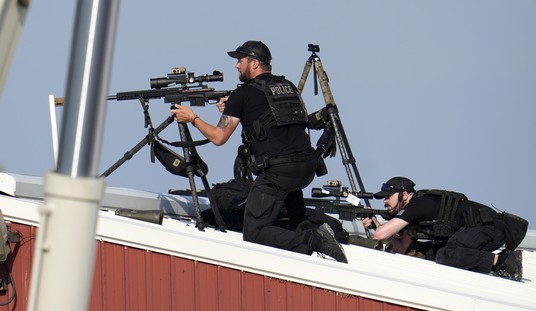
As Brandon Morse recounts, Antifa is getting ready to confront Ben Shapiro when he speaks at Berkeley, even though he’s not a neo-Nazi or white supremacist or Trump supporter or Trump voter. Last weekend, Antifa “activists” assaulted the organizers of the Patriot Prayer event at Berkeley; those organizers were not only not neo-Nazis or white supremacists, they weren’t even white. On the other side of the liberal spectrum are the tender left-wing snowflakes who might need counseling because of Shapiro’s appearance on campus.
But this brain damage isn’t confined to Berkeley. At Reed College in Portland, social justice warriors took the mike and commandeered a humanities class because it was “Eurocentric”. The teacher of said class “describes herself as mixed-race and queer”. We can only hope that Reed suffers enrollment setbacks like Evergreen State College, where intolerant leftists are actively trying to remove those professors who don’t prostrate themselves to their rigid worldview.
Along similar lines, not only are we seeing the infringement of free speech rights on college campuses, due process rights are also imperiled. Emily Yoffe wrote an amazing piece on the perverse effects of Obama’s 2011 Dear Colleague Letter, which forced college administrations to grow bureaucracies in the service of adjudicating sexual assault cases (even though many of those colleges are clearly unqualified to handle them), under the pain of yanking federal funding if found non-compliant with Title IX. In doing so, too many administrations denied basic due process rights to accused students and they ruined innocent lives. It’s worth a full read, but here’re the final paragraphs.
At its worst, Title IX is now a cudgel with which the government and school administrators enforce sex rules too bluntly, and in ways that invite abuse. That’s an uncomfortable statement. It does not cancel or diminish other uncomfortable statements: Women (and men) are assaulted on campus, those assaults can be devastating, and the victims do not always receive justice when they come forward. But we have arrived at the point at which schools investigate, adjudicate, and punish the kind of murky, ambiguous sexual encounters that trained law-enforcement officials are unable to sort out—and also at the point at which the definition of sexual misconduct on many campuses has expanded beyond reason.
Institutions of higher education must protect their students from crimes and physical harm. They should also model for their students how an open society functions, and how necessary it is to protect the civil liberties of everyone.
Amen, sister. In a follow-up piece, Ms. Yoffe discusses the introduction of neurobiology into college sexual assault cases.
As debate has begun over whether the rules governing sexual-assault adjudication have gone too far, one subject has received almost no attention, although it has become central to the way that many schools and many activists view sexual assault. In the last few years, the federal government has required that all institutions of higher education train staff on the effects of “neurobiological change” in victims of sexual assault, so that officials are able to conduct “trauma-informed” investigations and adjudications.
In meeting this federal demand, some schools have come to rely on the work of a small band of self-styled experts in the neurobiology of trauma who claim that sexual violations provoke a disabling, multifaceted physiological response. Being assaulted is traumatic, and no one should expect those who have been assaulted to have perfect recall or behave perfectly rationally, but this argument goes much further. It generally goes like this: People facing sexual assault become terrified, triggering a potent cascade of neurotransmitters and stress hormones.This chemical flood impairs the prefrontal cortex of the brain, impeding victims’ capacity for rational thought, and interferes with their memory. They may have significant trouble recalling their assault or describing it coherently or chronologically. The fear of imminent death may further elicit an extended catatonic state known as “tonic immobility,” rendering them powerless to speak or move—they feel “frozen.”
As a result, those adjudicating sexual-assault allegations are told, the absence of verbal or physical resistance, the inability to recall crucial parts of an alleged assault, a changing story—none of these factors should raise questions or doubt about a claim. Indeed, all of these behaviors can be considered evidence that an assault occurred.
Turns out it’s junk science. In most cases, when traumatic events occur, victims’ memories are enhanced–not addled–for basic self-preservation reasons.
There are so many more examples, but I’m trying to stick to stories that came up this week.













Join the conversation as a VIP Member